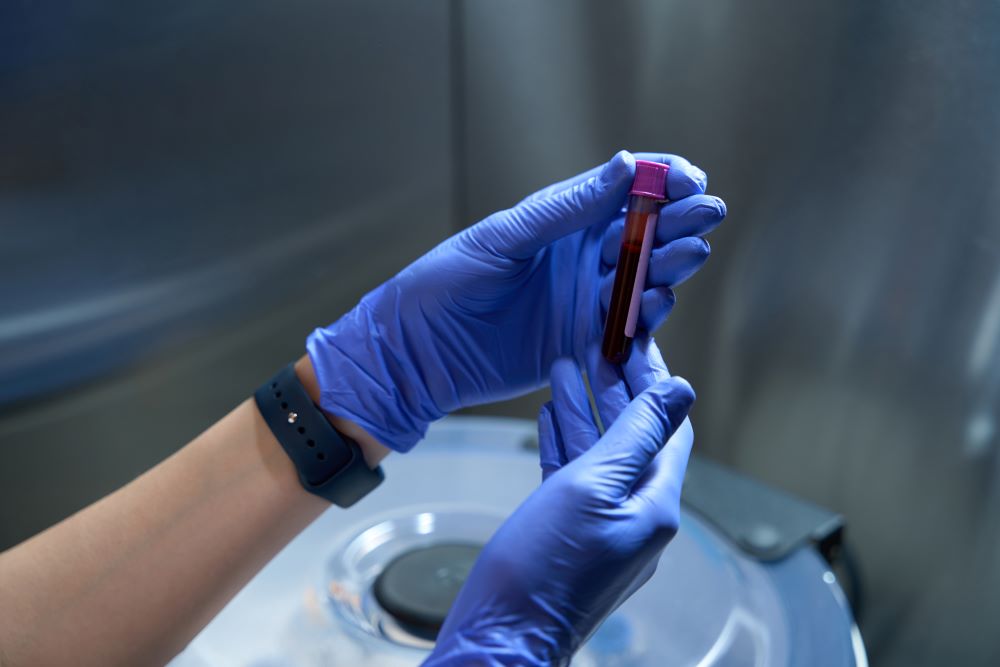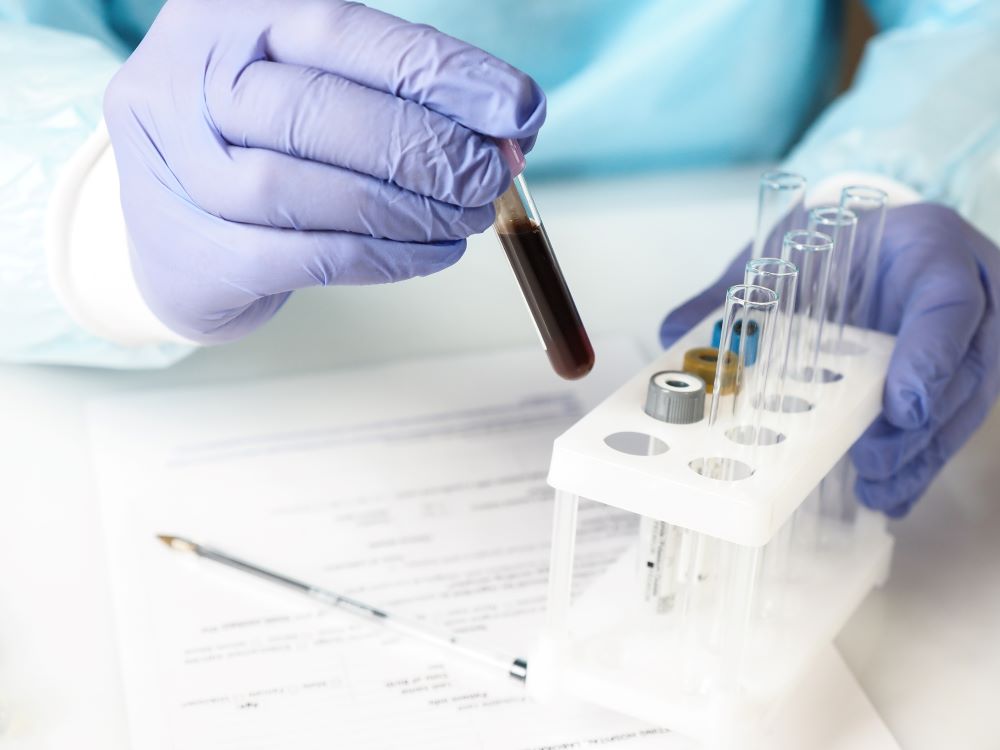Lactate Dehydrogenase (LDH) Test – Purpose & Risks Explained

Lactate Dehydrogenase (LDH) is a type of protein boosting the energy level in your body. Tissues in your heart, kidneys, brain, and lungs mainly constitute LDH. A LDH test has the role of measuring the level of LDH in your body. Doctors might ask you to undertake this test if they suspect damages in your tissues or enzymes.
Do you wish to learn more about the LDH test? Then, read till the end of this article to determine the causes, types, and treatments of LDH issues.

Table of Contents

What Is a Lactate Dehydrogenase (LDH) Test?
The LDH test helps check the LDH levels in your blood. In other cases, the doctors can also measure LDH levels in your urine or cerebrospinal fluid (CSF).
Lactate dehydrogenase is an enzyme essential for your body, particularly while turning sugar into energy for your cells. It is present in multiple organs and tissues across your body. When your cells are damaged by illness or injury, LDH releases into your bloodstream, causing an increase in your blood LDH level.
What Is the Purpose of Performing the LDH Test?
The LDH test assesses lactate dehydrogenase levels, which can help identify and monitor various health issues. Your doctor might ask you to do a test for the following reason:
- Checking for any tissue damages
- Monitoring infections and other health conditions, including hemolytic or megaloblastic anaemia, kidney and liver diseases
- Evaluating cancer treatment in the patients
- Finding the cause of fluid build ups such as injury or inflammation
- Determining if you have bacterial or viral meningitis
- Tracks chronic ailments like diabetes and Crohn’s disease that could affect RDW over time.
- Identifies shortages of essential vitamins or minerals, such as iron or vitamin B12, which can affect red blood cell production and size.
- The test assists in diagnosing diseases like thalassemia or aplastic anaemia that affect the formation and distribution of red blood cells.
- This might be done by performing this test before surgery. It will help establish whether there are any issues related to red blood cells.
When Should I Get the LDH Test?

The LDH test is one of the recommendations that a physician may make for purposes of thorough investigation and diagnosis of various health conditions:
- Damage to Tissue: To assess the level of tissue damage caused by heart attacks, liver disease, or muscle injuries.
- Monitoring Chronic Diseases: It can be used as part of ongoing monitoring for chronic diseases like anaemia, liver disease, and some cancers to track disease progression.
- No Known Cause for Symptoms: If you have any unexplained feelings of exhaustion, breathlessness, or pain, determine abnormalities caused by LDHs.
- Hemolytic Anaemia Diagnosis: High levels of LDH indicate hemolytic anaemia, which occurs when red blood cells break down too quickly.
- Excess Fluid Check: Pleural effusion or ascites are usually associated with fluid buildup; this test helps establish if such fluids were caused by infection or inflammation.
The LDH Test determines the amount of lactate dehydrogenase present in one's blood, an enzyme also associated with tissue damage or illness. Elevation of LDH levels may lead to several medical conditions, including disorders related to heart muscles and livers.
What Are the Types of LDH Isoenzymes?
There are usually about five different forms of Lactate Dehydrogenase, also called isoenzymes. Health researchers have differentiated these based on slight structural differences. These are as follows.
- LDH-1: Found in heart and red blood cells
- LDH-2: Found in heart and red blood cells
- LDH-3: Found in lymph tissue, platelets, lungs, pancreas
- LDH-4: Found in the liver and skeletal muscle
- LDH-5: Found in the liver and skeletal muscle
What Is the Procedure of the LDH Test?
Now that you know what an LDH test means, you might be curious about its procedure. Usually to check for LDH in blood tests, doctors will draw blood from your body by inserting a needle in your veins. However, doctors will insert a lumbar puncture or spinal tap on your lower back if the test is done for cerebrospinal fluid. In the case of infants, a sharp tool called a lancet is used to take a blood sample. The doctor will ask you all about your medical history, including the medicines, supplements, herbs, or vitamins that you are currently taking before conducting this test.
How Should You Prepare for the LDH Test?

Certain preparation guidelines must be followed before undergoing an LDH test to ensure that results are inexact. These include the following steps:
- Consult Your Doctor: It is possible that some drugs you are on could have an impact, so your physician may advise you not to take certain medications during the test.
- Fasting Requirements: Normally, there is no need to fast before a blood test for LDH, but depending on whether other tests are done simultaneously, you may be asked to fast.
- Avoid Strenuous Exercise: Steer away from vigorous physical activities at least one day before the test since these can cause a temporary increase in LDH levels.
- Hydration: Stay well-hydrated by drinking plenty of water before the test, as dehydration can interfere with blood tests.
- Relax Before the Test: Anxiety affects various blood parameters; thus, try to maintain peace and calm before drawing blood.
Such preparedness helps avoid false positive results or those related to external factors besides enzyme alterations.
How is LDH Measured in Blood Tests?
A small quantity of blood is taken from the patient’s vein for LDH testing and put into a vial or syringe. The sample is then sent to a laboratory, where it is analysed for LDH enzyme activity in the blood.
A lower LDH count in the blood tests may indicate reduced tissue damage. This could be attributed to recuperation from an illness or a smaller amount of cell injuries. An elevated level of LDH reveals damaged tissue or disease within the body caused by conditions like heart attack, liver diseases, muscle injury, and cancer, among others.
How to Read Results of LDH in a Blood Test?
An LDH test normally measures the levels of LDH in units per litre (U/L) of blood. Normal ranges may vary depending on specific reference values used by different laboratories. Whenever a physician suspects tissue damage, such as during a heart attack, liver disease, muscle injury, and some forms of cancer, an LDH test would be ordered to check its severity and also monitor it.
One can also ascertain from the results whether this rise is isolated or part of a bigger pattern by matching with other enzymes and markers. This helps narrow down possible causes of tissue damage.
The normal range of the LDH test usually differs on an individual level, depending on age and other health conditions. Usually, infants and young children have higher LDH levels than adults. So if you get the following Lactate Dehydrogenase levels in your test, it means your health condition is fine.
|
Age Group |
Normal LDH Level (In Units Per Litre) |
|
0 - 10 days |
290 - 2000 U/L |
|
10 days - 2 years |
180 - 430 U/L |
|
2 - 12 years |
110 - 295 U/L |
|
More than 12 years |
100 - 190 U/L |
What Are the Risks of High LDH Level?
A high LDH level in an LDH test primarily indicates tissue damage in your body. If a patient suffers from high LDH because of more than one isoenzymes, it implies more than one cause of damage in tissue (like a pneumonia patient having a heart attack). On the other hand, an extremely high level of Lactate Dehydrogenase in blood might represent a multi-organ failure or other serious health complications.
Symptoms of High LDH

Tissue damage, heart diseases, liver diseases, and certain types of cancers are the major reasons for high levels of LDH. Please review the chart below to see the symptoms that arise due to high levels of LDH. The following are possible symptoms when a person has elevated LDH:
What If LDH in the Blood is High?
A high LDH level in an LDH test primarily indicates tissue damage in your body. If a patient suffers from high LDH because of more than one isoenzyme, it implies more than one cause of damage in tissue (like a pneumonia patient having a heart attack). On the other hand, an extremely high level of Lactate Dehydrogenase in blood might represent a multi-organ failure or other serious health complications.
What Are the Causes of High LDH Levels?
Now that you know what the LDH test is, you must be curious about the causes of high LDH. Usually, high LDH levels in your blood can harm your health. Doctors are likely to recommend various treatment procedures in such conditions. Now, the question that arises here is, “what are the causes of high LDH levels?”. Different health conditions can trigger the growth of Lactate Dehydrogenase enzymes in the blood, which includes the following:
What Is the Treatment for High LDH?
High LDH results in different health conditions, including anaemia, heart and liver diseases, bone fractures, cancer, etc. The treatment procedure will be different for patients depending on their health condition because of high LDH. As LDH is spread across numerous tissues, additional diagnosis is required to identify the areas of tissue damage. Once the doctors determine the health condition triggering high LDH, they will start your treatment accordingly.
Symptoms of Low LDH
Low LDH levels can signal genetic conditions like LDH deficiency, which impact how cells use energy and can lead to various symptoms depending on the deficiency type.
What If LDH in the Blood is Low?
Usually, low levels of Lactate Dehydrogenase (LDH) are unusually rare and not harmful. However, they may signify an inherited condition called LDH Deficiency that affects cells' production and use of energy.
There are two types of this deficiency, each with its symptoms. Symptoms of LDH-A Deficiency (also known as glycogen storage disease XI) include fatigue, muscle pain and cramps during exercise, and rhabdomyolysis, which refers to the breakdown of muscles.
Individuals may also experience myoglobinuria in which myoglobin found in urine is evident, skin rashes, and red or brown-coloured urine leading to severe complications such as potential kidney damage. The body gradually loses tolerance for exercise due to weak muscles and a lack of ability to produce enough energy to be physically active.
What are the Causes of Low LDH?
Low LDH levels can explain why we might get certain health problems. While high LDH levels often indicate different diseases, low ones can imply specific underlying worries.
What Is the Treatment for Low LDH?
Low LDH (lactate dehydrogenase) levels are infrequent and normally harmless; however, in the presence of another disease like LDH deficiency, the treatment’s target is the symptoms’ control to prevent any possible complications.
This might include changes in diet, refraining from strenuous exercises, or having an eye on vitamin intake to balance nutritional deficiencies. It is important to have regular blood tests and follow-up visits to keep the level of LDH in check.
Sometimes, it may be necessary for individuals suffering from hereditary LDH deficiency to go through genetic counselling so that they can get a better understanding of their future generations’ risks.
How to Maintain LDH Levels?
Now that you know what LDH in a blood test is, you realise the risks arising from high levels of this enzyme in the blood. You can try to maintain an average LDH level with the help of the following activities.
- Include vitamin C-rich food items in your diet (citrus fruits, broccoli, Brussels sprouts, peppers etc.).
- Limit your alcohol consumption.
- Reduce specific drug consumptions, including anaesthetics, aspirin, narcotics, and procainamide.
As you can see, conducting an LDH test helps determine the LDH level in your blood and start immediate treatment if the levels are high. High LDH levels can be harmful, resulting in various life-threatening diseases. The test is quick and straightforward, and most doctors prefer to do it before undertaking any detailed diagnosis.
Protect What Matters - Explore Other Insurance Options














